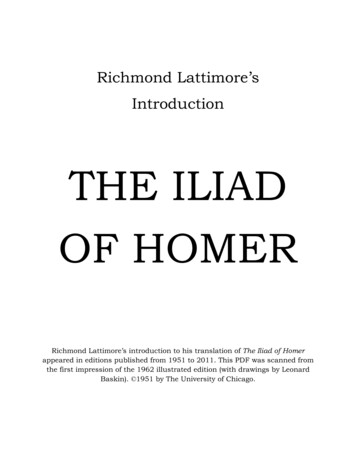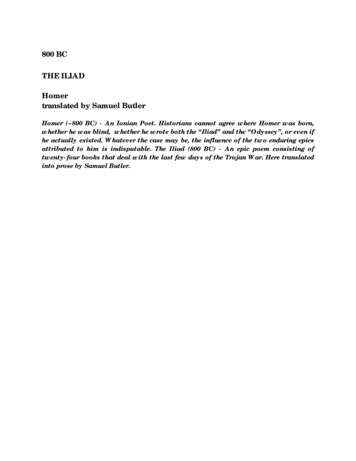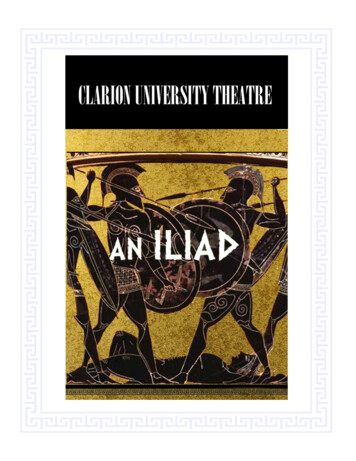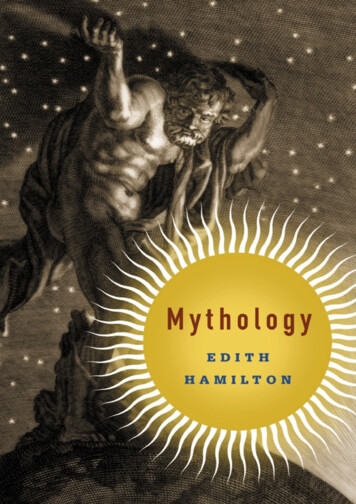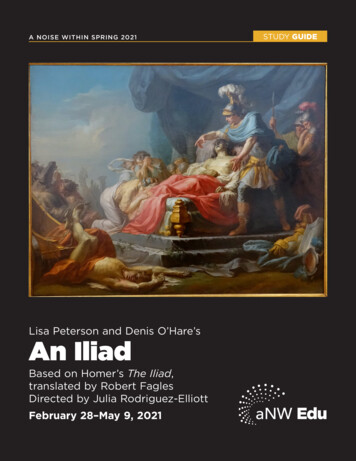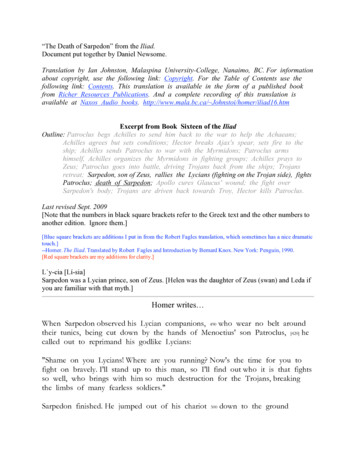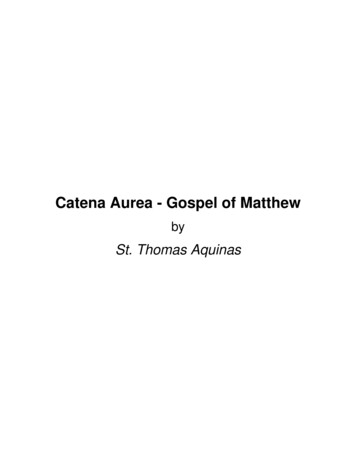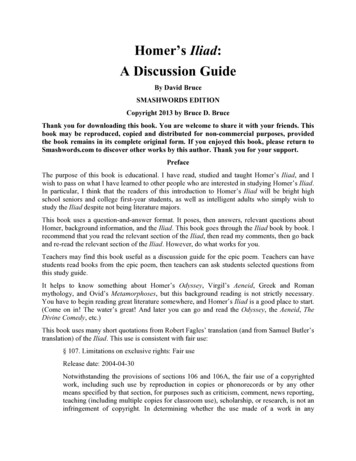
Transcription
Homer’s Iliad:A Discussion GuideBy David BruceSMASHWORDS EDITIONCopyright 2013 by Bruce D. BruceThank you for downloading this book. You are welcome to share it with your friends. Thisbook may be reproduced, copied and distributed for non-commercial purposes, providedthe book remains in its complete original form. If you enjoyed this book, please return toSmashwords.com to discover other works by this author. Thank you for your support.PrefaceThe purpose of this book is educational. I have read, studied and taught Homer’s Iliad, and Iwish to pass on what I have learned to other people who are interested in studying Homer’s Iliad.In particular, I think that the readers of this introduction to Homer’s Iliad will be bright highschool seniors and college first-year students, as well as intelligent adults who simply wish tostudy the Iliad despite not being literature majors.This book uses a question-and-answer format. It poses, then answers, relevant questions aboutHomer, background information, and the Iliad. This book goes through the Iliad book by book. Irecommend that you read the relevant section of the Iliad, then read my comments, then go backand re-read the relevant section of the Iliad. However, do what works for you.Teachers may find this book useful as a discussion guide for the epic poem. Teachers can havestudents read books from the epic poem, then teachers can ask students selected questions fromthis study guide.It helps to know something about Homer’s Odyssey, Virgil’s Aeneid, Greek and Romanmythology, and Ovid’s Metamorphoses, but this background reading is not strictly necessary.You have to begin reading great literature somewhere, and Homer’s Iliad is a good place to start.(Come on in! The water’s great! And later you can go and read the Odyssey, the Aeneid, TheDivine Comedy, etc.)This book uses many short quotations from Robert Fagles’ translation (and from Samuel Butler’stranslation) of the Iliad. This use is consistent with fair use:§ 107. Limitations on exclusive rights: Fair useRelease date: 2004-04-30Notwithstanding the provisions of sections 106 and 106A, the fair use of a copyrightedwork, including such use by reproduction in copies or phonorecords or by any othermeans specified by that section, for purposes such as criticism, comment, news reporting,teaching (including multiple copies for classroom use), scholarship, or research, is not aninfringement of copyright. In determining whether the use made of a work in any
particular case is a fair use the factors to be considered shall include —(1) the purpose and character of the use, including whether such use is of a commercialnature or is for nonprofit educational purposes;(2) the nature of the copyrighted work;(3) the amount and substantiality of the portion used in relation to the copyrighted workas a whole; and(4) the effect of the use upon the potential market for or value of the copyrighted work.The fact that a work is unpublished shall not itself bar a finding of fair use if such findingis made upon consideration of all the above factors.Source of Fair Use information: http://www.law.cornell.edu/uscode/text/17/107 .This is Ian Johnston’s copyright notice for his translation of Homer’s Iliad:Copyright Notice for Documents on the johnstonia Web PagesAll e-texts on johnstonia web pages are available for personal use by anyone, without permissionand without charge. They may be downloaded, printed, and distributed freely, in whole or inpart, provided the source is acknowledged.Teachers who wish to prepare copies of a text for their students are free to do so, provided thesource is acknowledged.Performing artists can use the material free of charge for dramatic productions, public readings,and adaptations, provided the source is acknowledged and provided they inform Ian Johnston ofthe event.Commercial publication of any of the material in book form is prohibited, without thewritten permission of the author or translator.See https://records.viu.ca/ Johnstoi/index.htm for Ian Johnson’s Johnstonia.I will not make a dime from this discussion guide.I recommend that you read the translations by Robert Fagles and by Ian Johnston.Ian Johnston of Malaspina University-College, Nanaimo, BC has an excellent translationavailable free athttp://records.viu.ca/ johnstoi/homer/iliad title.htmI also recommend Elizabeth Vandiver’s course on the Iliad, which is available from theTeaching Company.The book titles are taken from the translations by Robert Fagles and Ian Johnston. TheFagles titles appear first. Occasionally, both translators use the same title.Introduction to Homer’s Iliad, Pt. 1: Background MaterialImportant Terms:
isJudgment of ParisAeneasAeneid Why is it necessary to know background information about the Trojan War whenreading Homer’s Iliad and Odyssey?Homer is an epic poet who tells traditional stories that his audience is already very familiar with.Because of that, Homer does not need to explain who his characters are or even the major eventsof the Trojan War, such as how it started or how it will end. Homer is able to jump into themiddle of the story in the Iliad and start telling about an incident that occurred during the finalyear of the Trojan War.Of course, Homer’s contemporary audience is very different from his audience of today. Homercreated and performed his epic poems hundreds of years before Jesus of Nazareth was born.Homer came from an oral tradition, and he seems to have composed his poems either beforewriting was invented or perhaps when writing was coming into use. Possibly, he saw theadvantages of writing, and he used the new technology of writing to create two very long, verycomplex poems, both of which I would personally put in a list of the top 10 books ever created.Anyone who reads Homer today (and in Homer’s time, they would have probably heard Homeror heard a bard perform Homer’s epic poems) will most likely not have been brought up hearingthese traditional stories, the way that Homer’s contemporary audience would have. Chances are,
university students reading Homer in a Great Books course at a university would have read aboutOdysseus’ adventure with the Cyclops, and that’s about it.That is why this introduction to Homer’s Iliad will fill you in on the background necessary tounderstand and enjoy the Iliad. What are the Iliad and the Odyssey?The Iliad and the Odyssey are epic poems that have been created by Homer. Here are twodefinitions of “epic poem”: a long narrative poem about the adventures of [a] hero or the gods, presenting anencyclopedic portrait of the culture in which it is composed.Source: yLiteraryandAngloSaxonTerms.doc a long narrative poem telling of a hero’s deeds.Source: wordnet.princeton.edu/perl/webwn The Iliad tells the story of one incident that lasted a few days during the last year of the TrojanWar: a quarrel between Achilles, the mightiest of the Greek (Achaean) warriors, andAgamemnon, leader of the Greek armies against Troy. Both Achilles and Agamemnon are kingsof their own lands, but Agamemnon is the leader among the many kings fighting the Trojans andthe Trojan allies. The quarrel between Achilles and Agamemnon has devastating consequences. What is the mythic background of the Iliad and the Odyssey?The mythic background of the Iliad and the Odyssey consists of the Trojan War myth and mythsabout the Greek gods and goddesses. For what other works did this mythic background provide narrative material?The Trojan War myth provided material for many other epic poems, both Greek and Roman,some of which have survived, and for many plays, including both tragedies and comedies, bymany Greek and Roman authors. The Trojan War myth is one of the most important myths in theworld.During Roman times, the Trojan War myth provided material for Virgil’s great epic poem theAeneid, which tells the story of Aeneas and how he survived the fall of Troy and came to Italy tofound (establish) the Roman people. He and his Italian wife, Lavinia, became importantancestors of the Romans. Later, Dante used material from the Trojan War myth and its aftermathin his Divine Comedy. Material from the Trojan War myth has appeared in opera and in drama.Of course, James Joyce uses this material in his novel Ulysses. What is the Iliad about?The Iliad tells the story of the quarrel between Achilles and Agamemnon. Following the quarrel,Achilles (the mightiest Greek warrior) withdraws from the fighting, which allows the Trojans tobe triumphant in battle for a while. The Iliad tells about Achilles’ anger and how he finally letsgo of his anger.
What is the Odyssey about?The Odyssey is about a different Greek hero in the Trojan War: Odysseus, whose Roman name isUlysses. Following the 10 years that the Trojan War lasted, Odysseus returns to his home islandof Ithaca, where he is king. It takes him 10 years to return home because of his adventures andmishaps. Much of that time he spends in captivity. When he finally returns home, he discoversthat suitors are courting his wife, Penelope, who has remained faithful to him and who wantsnothing to do with the suitors, who are rude and arrogant and who feast on Odysseus’ cattle anddrink his wine as they party all day. In addition, Telemachus, Odysseus’ son, has found it hard togrow up without a strong father-figure in his life. The Odyssey tells the story of how Odysseusreturns home to Ithaca and reestablishes himself in his own palace. What is the Aeneid about?The Aeneid is a Roman epic poem by Virgil that tells the story of Aeneas, a Trojan prince whosurvived the fall of Troy and led other survivors to Italy. His adventures parallel the adventuresof Odysseus on his return to Ithaca. In fact, they visit many of the same places, including theisland of the Cyclopes. One of Aeneas’ most notable characteristics is his pietas, his respect forthings for which respect is due, including the gods, his family, and his destiny. His destiny is tofound the Roman people, which is different from founding Rome, which was founded long afterhis death. Aeneas journeyed to Carthage, where he had an affair with Dido, the Carthaginianqueen. Because of his destiny, he left her and went to Italy. Dido committed suicide, and Aeneasfought a war to establish himself in Italy. After killing Turnus, the leader of the armies facinghim, Aeneas married the Italian princess Lavinia, and they became important ancestors of theRoman people. What is the basic story of the Trojan War?The basic story of the Trojan War can be told very quickly. Paris, prince of Troy, visitsMenelaus, King of Sparta, and then Paris runs off with Menelaus’ wife, Helen, who of coursebecomes known as Helen of Troy. This is a major insult to Menelaus and his family, so he andhis elder brother, Agamemnon, lead an army against Troy to get Helen (and reparations) back.The war drags on for 10 years, and the greatest Greek warrior is Achilles, while the greatestTrojan warrior is Hector, Paris’ eldest brother. Eventually, Hector is killed by Achilles, who isthen killed by Paris, who is then killed by Philoctetes. Finally, Odysseus comes up with the ideaof the Trojan Horse, which ends the Trojan War.That is a brief retelling of the Trojan War, but many, many myths grew up around the war,making it a richly detailed myth. Does Homer allude to all of the details of the Trojan War?Homer does not allude to all the details of the Trojan War. For example, one myth states thatAchilles was invincible except for his heel. Supposedly, his mother, the goddess Thetis, knewthat Achilles was fated to die in the Trojan War; therefore, to protect him, she dipped him into apool of water that was supposed to make him invulnerable. To do that, she held him by his heel.Because she was holding him by his heel, the water did not touch it and so that part of Achilles’body remained vulnerable.Homer never alludes to this myth; in fact, this myth plays no role whatsoever in Homer’s epic
poems. Achilles is not invulnerable. If he were, he could fight in battle naked, as long as he worean iron boot over his vulnerable heel. In Homer, Achilles is vulnerable to weapons, and heknows it. At one point, he would like to join the fighting, but he cannot, because he has noarmor. No one who reads the Iliad should think that Achilles is invulnerable except for his heel.Myth changes and develops over time, and it is possible that Homer had no knowledge of thismyth because it had not been created yet. Or it is possible that Homer knew of this myth butignored it because he had his own points to make in his epic poem.Another myth that may or may not be alluded to is the Judgment of Paris. It may be alluded to ina couple of places in the Iliad, but scholars disagree about this. Who is Achilles, and what is unusual about his mother, Thetis?Achilles, of course, is the foremost warrior of the Greeks during the Trojan War. His mother,Thetis, is unusual in that she is a goddess. The Greeks’ religion was different from modernreligions in that they were polytheistic (believing in many gods) rather than monotheistic(believing in one god). In addition, the gods and human beings could mate with each other.Achilles is unusual in that he had an immortal goddess as his mother and a mortal man, Peleus,as his father. Achilles, of course, is unusual in many ways. Another way in which he is unusual isthat he and Thetis have long talks together. Often, the gods either ignore their mortal offspring orchoose not to reveal themselves to them. For example, Aeneas’ goddess mother is Aphrodite(Roman name: Venus). Although Aphrodite does save Aeneas’ life or help him on occasion, thetwo do not have long talks together the way that Achilles and Thetis do. Which prophecy about Achilles was given to his mother, Thetis?The prophecy about Thetis’ male offspring was that he would be a greater man than his father.This is something that would make most human fathers happy. (One exception would be Pap, inMark Twain’s Adventures of Huckleberry Finn. Pap does not want Huck, his son, to learn to readand write or to get an education or to live better than Pap does.) Who is Zeus, and what does he decide to do as a result of this prophecy?Zeus is a horny god who sleeps with many goddesses and many human beings. Normally, hewould lust after Thetis, but once he hears the prophecy, he does not want to sleep with Thetis.For one thing, the gods are potent, and when they mate they have children. Zeus overthrew hisown father, and Zeus does not want Thetis to give birth to a greater man than he is because hisson will overthrow him. Therefore, Zeus wants to get Thetis married off to someone else. In thiscase, a marriage to a human being for Thetis would suit Zeus just fine. A human son may begreater than his father, but is still not going to be as great as a god, and so Zeus will be safe ifThetis gives birth to a human son. Who is Peleus?Peleus is the human man who marries Thetis and who fathers Achilles. At the time of the Iliad,Peleus is an old man and Thetis has not lived with him for a long time. Why is Eris, Goddess of Discord, not invited to the wedding feast of Peleus and Thetis?Obviously, you do not want discord at a wedding, and therefore, Eris, Goddess of Discord, is notinvited to the wedding feast of Peleus and Thetis. Even though Eris is not invited to the wedding
feast, she shows up anyway. Eris, Goddess of Discord, throws an apple on a table at the wedding feast. What isinscribed on the apple?Inscribed on the apple is the phrase “For the fairest,” written in Greek, of course. Because Greekis a language that indicates masculine and feminine in certain words, and since “fairest” has afeminine ending, the apple is really inscribed “for the fairest female.” Hera, Athena, and Aphrodite each claim the apple. Who are they?Three goddesses claim the apple, meaning that each of the three goddesses thinks that she is thefairest, or most beautiful.HeraHera is the wife of Zeus, and she is a jealous wife. Zeus has many affairs with both immortalgoddesses and mortal women, and Hera is jealous because of these affairs. Zeus would like tokeep on her good side.AthenaAthena is the goddess of wisdom. She becomes the patron goddess of Athens. Athena especiallylikes Odysseus, as we see especially in the Odyssey. Athena is a favorite of Zeus, her father.Zeus would like to keep on her good side.AphroditeAphrodite is the goddess of sexual passion. She can make Zeus fall in love against his will. Zeuswould like to keep on her good side. Why doesn’t Zeus want to judge the goddesses’ beauty contest?Zeus is not a fool. He knows that if he judges the goddesses’ beauty contest, he will make twoenemies. The two goddesses whom Zeus does not choose as the fairest will hate him and likelymake trouble for him.Please note that the Greek gods and goddesses are not omnibenevolent. Frequently, they arequarrelsome and petty.By the way, Athens, Ohio, lawyer Thomas Hodson once judged a beauty contest featuring 25cute child contestants. He was running in an election to choose the municipal court judge, and hethought that judging the contest would be a good way to win votes. Very quickly, he decidednever to judge a children’s beauty contest again. He figured out that he had won two votes — thevotes of the parents of the child who won the contest. Unfortunately, he also figured out that hehad lost 48 votes — the votes of the parents of the children who lost. Who is Paris, and what is the Judgment of Paris?Paris is a prince of Troy, and Zeus allows him to judge the three goddesses’ beauty contest. Parisis not as intelligent as Zeus, or he would try to find a way out of judging the beauty contest. Each of the goddesses offers Paris a bribe if he will choose her. What are the bribes?
HeraHera offers Paris political power: several cities he can rule.AthenaAthena offers Paris prowess in battle. Paris can become a mighty and feared warrior.AphroditeAphrodite offers Paris the most beautiful woman in the world to be his wife. Which goddess does Paris choose?As most of you know, Paris chose Aphrodite, who offered him the most beautiful woman in theworld to be his wife.This is not what a Homeric warrior would normally choose. A person such as Achilles wouldchoose to be an even greater warrior, if that is possible.A person such as Agamemnon is likely to choose more cities to rule.When Paris chooses the most beautiful woman in the world to be his wife, we are not meant tothink that he made a good decision. Paris is not a likable character. Does the Judgment of Paris appear in the Iliad?Maybe. Maybe not. A couple of passages in the Iliad may contain a veiled reference to theJudgment of Paris. Does myth develop over time?Myth does develop over time. Possibly, the myth of the Judgment of Paris was invented afterHomer had created the Iliad and the Odyssey. As a result of Aphrodite’s bribe, Paris abducts Helen. Why?Aphrodite promised Paris the most beautiful woman to be his wife. As it happens, that woman isHelen. Therefore, Paris abducts Helen, with Aphrodite’s good wishes.Did Helen go with Paris willingly? The answer to this question is ambiguous, and ancientauthorities varied in how they answered this question. To whom is Helen already married?Helen is already married to Menelaus, the King of Sparta. Paris visits Menelaus, and when heleaves, he carries off both a lot of Menelaus’ treasure and Menelaus’ wife, Helen. Obviously, thisis not the way that one ought to treat one’s host. Who are Agamemnon and Menelaus?Agamemnon and Menelaus are the sons of Atreus. They are brothers, and Agamemnon, the Kingof Mycenae, is the older brother and the brother who rules a greater land, as seen by the numberof ships the two kings bring to the Trojan War. Menelaus brings 60 ships (Fagles 2.678-679).Agamemnon brings 100 ships (Fagles 2.667-672).
Who is responsible for leading the expedition to recover Helen?Agamemnon is the older brother, so he is the leader of the Greek troops in the Trojan War. Why do the winds blow against the Greek ships?When the Greek ships are gathered together and are ready to set sail against Troy, a wind blowsin the wrong direction for them to sail. The goddess Artemis (Roman name: Diana) is angry atthe Greeks because she knows that the result of the Trojan War will be lots of death, not just ofwarriors, but also of women and children. This is true of all wars, and it is a lesson that humanbeings forget after each war and relearn in the next war. Why does Artemis demand a human sacrifice?Artemis knows that Agamemnon’s warriors will cause much death of children, so she makes himsacrifice one of his daughters so that he will suffer what he will make other parents suffer. Who does Agamemnon sacrifice?Agamemnon sacrifices his daughter Iphigeneia. This is a religious sacrifice of a human life toappease the goddess Artemis. Did Homer know about this sacrifice?Very possibly, he did. In Book 1 of the Iliad, Agamemnon tells the prophet Calchas that healways brings bad news to Agamemnon. Calchas is the prophet who told Agamemnon that hehad to sacrifice his daughter in order to get winds that would sail the ships to Troy. What do Menelaus and Agamemnon do?After the sacrifice of Iphigenia, Agamemnon and Menelaus set sail with all the Greek ships forTroy. They land, then they engage in warfare. Who are Achilles and Hector?Achilles is the foremost Greek warrior, while Hector is the foremost Trojan warrior. Bothwarriors are deserving of great respect. Does Homer assume that Achilles is invulnerable?Absolutely not. Achilles needs armor to go out on the battlefield and fight. What happens to Hector and Achilles?Hector kills Achilles’ best friend, Patroclus, in battle. Angry, Achilles kills Hector. Later, Paris(assisted by Apollo) kills Achilles. What is the story of the Trojan Horse?Odysseus, a great strategist, thought up the idea of the Trojan Horse. Epeus built it.The Greeks build a giant wooden horse, which is hollow and filled with Greek warriors, thenthey pretend to abandon the war and to sail away from Troy. Actually, Agamemnon and theother Greeks sail behind an island so that the Trojans cannot see the Greek ships. The Greeksalso leave behind a lying Greek named Sinon, who tells the Trojans about a supposed prophecy
that if the Trojans take the Horse inside their city, then Troy will never fall. The Trojans do that,and at night the Greeks come out of the Trojan Horse, make their way to the city gates and openthem. Outside the city gates are the Greek troops led by Agamemnon, who have returned to theTrojan plain. The Greek warriors rush inside the city and sack it.Virgil’s Aeneid has the fullest surviving ancient account of the Trojan Horse. Of course, he tellsthe story from the Trojan point of view. If Homer had written the story of the Trojan Horse, hewould have told it from the Greek point of view. For the Greeks, the Trojan War ended in a greatvictory. For the Trojans, the Trojan War ended in a great disaster. Which outrages do the Greeks commit during the sack of Troy? King Priam is killed by Achilles’ son, Neoptolemus, aka Pyrrhus, at the altar of Zeus. This is anoutrage because anyone who is at the altar of a god is under the protection of that god. WhenNeoptolemus kills Priam, an old man (and old people are respected in Homeric culture),Neoptolemus disrespects the god Zeus. Hector’s son is murdered. Hector’s son is a very small child who is murdered by being hurledfrom the top of a high wall of Troy. Even during wartime, children ought not to be murdered, sothis is another outrage. Cassandra is raped by Little Ajax even though she is under the goddess Athena’s protection.Cassandra is raped in a temple devoted to Athena. This is showing major disrespect to Athena.Again, the Greeks are doing things that ought not to be done, even during wartime. The Greeks sacrificed Priam’s young daughter Polyxena. The Trojan War begins and ends witha human sacrifice of the life of a young girl. This is yet another outrage. How do the gods react to these outrages?The gods and goddesses make things difficult for the Greeks on their way home to Greece. What happens to the Greeks after the fall of Troy?Nestor is a wise, pious, old man who did not commit any outrages. He makes it home quickly.Athena is angry at all of the Greeks, so she does not help Odysseus on his journey home until 10years have passed.Little Ajax, who raped Cassandra, drowns on his way home.Agamemnon returns home to a world of trouble. His wife, Clytemnestra, has taken a lover duringhis 10-year absence, and she murders Agamemnon.Menelaus is reunited with Helen, but their ship is driven off course, and it takes them years toreturn home to Sparta. What happens to Aeneas?Aeneas fights bravely, and he witnesses such things as the death of Priam, King of Troy;however, when he realizes that Troy is lost, he returns to his family to try to save them. Hecarries his father on his back, and he leads his young son by the hand, but although he savesthem by leading them out of Troy, his wife, who is following behind him, is lost in the battle.
Aeneas becomes the leader of the Trojan survivors, and he leads them to Italy, where theybecome the founders of the Roman people. Who were the Roman people?The Romans had one of the greatest empires of the world. In the Homeric epics, are human beings responsible for their actions?Yes, human beings are responsible for their actions in the Homeric epics. Despite Aphrodite, is Paris responsible for his actions?Of course, Aphrodite promised Paris the most beautiful woman in the world to be his wife ifParis chose her as the fairest of the three goddesses who wanted the golden apple. However,Paris is responsible for his actions when he runs away with Helen, the lawful wife of Menelaus.Paris could have declined to run away with Helen. Is Agamemnon responsible for his actions?Artemis required the sacrifice of Agamemnon’s daughter before the winds would blow the Greekships to Troy, but Agamemnon is still responsible for his actions. He could have declined tosacrifice his daughter, and he could have given up the war. What happens to humans who do impious acts?Humans who do impious acts are punished for their impious acts. What is the Greek concept of fate?The Greeks do believe in fate. We are fated to die at a certain time, although we do not knowwhen we will die.In addition, people may be fated to do certain things in their lives. For example, Oedipus is fatedto kill his father and to marry his mother.Similarly, certain events are fated to happen. For example, Troy is fated to be conquered in theTrojan War. Do the Iliad and the Odyssey tell the entire story of the Trojan War?No, they tell only a small part of the story. The Iliad tells the story of an event that occurred in afew weeks of the final year of the Trojan War. The story of the Trojan War is not fully told ineither epic poem. Neither is the story of the Trojan Horse, although knowledge of it is essentialfor understanding the Iliad, and although the Trojan Horse is talked about briefly in the Odyssey. What happened the first time the writer of this discussion guide read the Iliad?I read the Iliad for the first time the summer before I started college. It was my way of preparingmyself to be educated. As I got near the end of the Iliad, I started wondering, “Where is theTrojan Horse?” When I got to the end of the Iliad, I was very surprised that Troy had not yetfallen. Did other epics exist?
Yes, other epics did exist, and we do have some Roman epics that were written much later thanthe Iliad and the Odyssey, of course. The other ancient Greek epics from the time of Homer havenot survived. Fortunately, we know from ancient commentators that we have the really good epicpoems. The epics that have been lost were not as good as the Iliad and the Odyssey. What do the Homeric epics assume?The Homeric epics assume that you know the mythic background, which is why I have writtenabout it in this introduction to the Iliad. What is the society described in the Homeric epics like?Classics scholar Elizabeth Vandiver points out that Homeric society is very different from oursociety; it is patriarchal, slave-holding, monarchical, and polytheistic (The Iliad of Homer 1314):PatriarchalThis is a society in which the men have the power. Of course, the goddesses are a special caseand are more powerful than human men. However, even in the world of gods and goddesses, thegods have more power. The King of the gods is Zeus, a male. Often, contemporary Americansociety is thought of as patriarchal. I won’t deny that, but the ancient Greek society was muchmore patriarchal than contemporary American society.Slave-HoldingSlaves exist in the Iliad and the Odyssey. In the Iliad, women are spoils of war, and young, prettywomen become sex-slaves to the warriors who have killed their husbands. In the Odyssey, slavesare servants in the palace and on the farm. Slavery is taken for granted in the Homeric epics.MonarchicalKings exist in the Iliad and the Odyssey. Agamemnon is a king, Menelaus is a king, Achilles is aking, Odysseus is a king, etc.PolytheisticAs we have seen, the ancient Greeks and Romans believed in many gods. Moderns tend tobelieve or to disbelieve in one god.ConclusionAncient Greek society is very much different from our modern American society. All you can dois to start reading. Don’t worry. Soon, you will understand ancient Greek society much better.Introduction to Homer’s Iliad, Pt. 2: Focus on the GodsAn Important NoteFor more information about the role of the gods in the Iliad, read Elizabeth Vandiver’s “TheParadox of Glory” in her The Iliad of Homer, pp. 101-111, to which I am greatly indebted.Important Terms
Theos (THAY os): g
I also recommend Elizabeth Vandiver’s course on the Iliad, which is available from the Teaching Company. The book titles are taken from the translations by Robert Fagles and Ian Johnston. The Fagles titles appear first. Occasionally, both translators use the same title. Introduction to Homer’s Il


